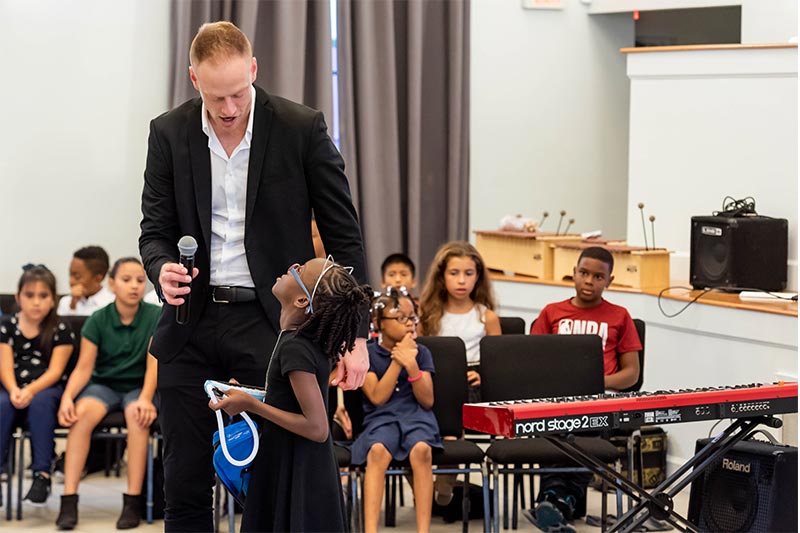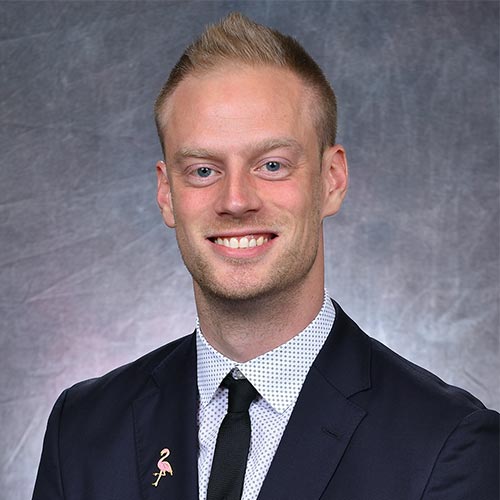
A pit stop at Teach for America turned into an uplifting career for Trevor Ditzler ‘09 (BA Psychology and Religious Studies)
He is a living example of the importance and impact extracurriculars can have on a student. Ditzler is bringing opportunities that he had growing up to underprivileged youth in Miami through his after-school program, Up! Miami.
In this Alumni Q&A, Ditzler explains the importance of self-expression through music and his journey to be the founder of a growing after school program that’s changing lives for the better.

What lessons and experiences at UCSB helped build the foundation for your career today?
I was in a lot of different music programs at UCSB while I was there. I was in the chamber choir, I sang with the Jazz band, I was in BFOM, Naked Voices. I would say one of the formative experiences I had at UCSB was really through the acapella culture of being a part of a totally student led and run organization. We travelled, competed, performed, and released albums. I became President of Naked Voices and that type of entrepreneurial experience and being able to work with a really smart group of people to kind of create something and make it successful has really informed a lot of my career as an adult. It really made me unafraid to jump into or launch brand new ventures. That type of student leadership really set me up for success in a variety of different ways for the future.
Have you been involved with music all your life?
I’ve been singing since I was 5 and think that music was a way to express myself. Growing up in Northern California, it wasn’t until I came to UCSB that I met someone who was queer. I was deeply in the closet, so I was using music and the arts as a medium of survival as well. The list for High School music is even longer than the college one, I don’t know if you want to hear all that (laughs). I was fortunate for those experiences as well as those at UCSB because the organization that I work for now truly believes in a comprehensive music education. I think that I was able to attend UCSB and be successful there because of the strong background I have in the arts that was provided through public school.
Tell us more about Teach for America.
I taught at Miami Elementary School. I really struggled at first but then fought to be the teacher that my kids needed me to be and ended up achieving a lot of success as a teacher and with my students. I really found it difficult to leave. I fully planned on going to law school and getting a Ph.D. in Political Science after two years of service. I thought this would be a great couple years of my life, but I just fell in love and couldn’t escape. The Teach for America commitment is two years, but I taught in the classroom for six years.
As I was in the classroom, I founded two dance teams and a coding and robotics club for girls. I did summer school with a couple of other teachers. People thought we were crazy, but we were able to do a lot of different things during the summer. I traveled around the country for three of four summers with Teach for America training new teachers how to be teachers as well, and I learned a lot from that.
What drew you to create Up! Music with Achieve Miami?
I started achieving success as a teacher. I realized my students were outperforming their peers at the school, even in the district averages on mini assessments. For the schools that were served, generally the percent proficient is like 25% or lower on a given subject and the district would be at 50 or 60%. So, there’s really significant gaps in terms of access and opportunity for those kids.
I started closing those gaps and looked around and realized the kids are still not getting what they really need to be successful. I began thinking what are some things that I have access to, what enables me to thrive beyond concrete academics. So that’s how I founded the first two dance teams. At first, people who I know to be influential and would end up funding future programs, would say, “You’re crazy, why are you spending time on this, you’re doing this for free.” But I really was enjoying it and I felt that it was giving a lot back to the kids and we started achieving a lot of success from it.
Twenty of the kids over two years were admitted to the Miami City School of Ballet, which is a professional company. They were able to go for free until they entered college. We had some of the only boys and about 80-90% of students that were Black and admitted to the program were from our one little after school program. I’m happy with what we’re doing here, and it’s like I would have never done that if I hadn’t followed my instincts and done something more artistic with kids. So, seeing the success of that initiative and other initiatives in the arts led to me being offered a funding proposal to found (alongside Achieve Miami) this music after school program. I initially launched it as a classroom teacher, and it was after school at two schools two days a week. Now it’s at four schools, soon to be 7 schools. We have 250 students and if everything goes according to plan, we should have over 400 students in everyday music instruction. It’s awesome and I love it. I work with a lot of awesome, talented kids.
There were definitely periods where I just wasn’t sure about what was going to happen next or where my life would go at all. If I could go back in time and give myself advice, it would be to trust my instincts and push really hard for the things I believed in.
What would you like to see for the future of Up! Music?
I think I’m realizing more and more that on a larger scale you’re fighting an uphill battle unless you have real policy change. We need as a society to invest in these things. I’m so proud of the work that we’re doing and the scale of the program, but at the same time there are hundreds of elementary schools in Miami. They all have various levels of music access. Until we demand that every child has access to not just music, but sports and extracurriculars, it’s almost like a drop in the bucket. My next imagining is what would it take to really generate new policy that supports students, in particular expansive opportunities for them that are free or low cost to their families. I think overall, that ties into how we level the playing field. We know there’s a lot of kids that do have access to those things and because of that access they do better which widens the gap even more.
Why did you choose UC Santa Barbara?
I visited UCSB and I think it’s one of the most beautiful college campuses and places on earth. I really just fell in love with the environment, the people and am still proud to be a Gaucho.
How did you decide to study Psychology and Religious Studies?
In Northern California where I grew up, there’s a lot of conflicting and extreme religious movements. From conservative evangelical Christianity to being the birthplace of New Age Spirituality, being raised in that. It is fascinating to me in terms of how religion produces conflict and peace. With psychology, I’ve always been intrigued with mental health as well as how people’s brains work and interact with each other. I remember going to India with Professor Gurinder Singh Mann when I was a junior. It was with a bunch of graduate students and people who knew so much more than I did, so that was a really great experience as well.
Why did you decide to go into War Studies?
War Studies was the intersection of Psychology and Religious Studies all mixed up in one. I did the Terrorism, Security, and Society MA. I’m still absolutely obsessed with politics, and power and privilege, but I came back to the US with a MA at 23 years old and really did not have a ton of options that would not have sacrificed my beliefs. I really decided to come back and dedicate myself to service. So, I joined Teach for America and came to Miami.
Do you have any advice for recent graduates?
Think about what you’re passionate about and what you care enough about deeply to work incredibly hard at and that you can provide value in and then just do it really, really well. You’ll have the life you want. I did not think as a teacher, in the schools that I was placed in that it would lead to anything other than kind of like me being fulfilled and my kids doing better. I had no idea about the gateways and the doors that would open for me just by focusing really hard and doing a good job at that thing. It enabled me to get funding for this program, and do x,y and z because I had proof points of what was possible if someone invested in me. I guess I didn’t realize that as I was working hard on being a teacher.
What inspires you?
What inspires and fortifies me is the wealth of talent of future generations and their capacity to do awesome stuff that I won’t ever even be able to do. For example, we have wind instruments in our program, and I would have loved to have had access to that kind of thing. Every kid in our program has to do voice, they have to do percussion, they have to do wind instruments- so watching some of them just play a couple scales on a clarinet or trumpet. Like I can’t do that, and they’re like 8! Imagining what the future holds for them is very motivating to me. In the absence of people who have power and privilege; demanding that people who don’t have access to those things; then that kid would not have been holding a trumpet. I don’t want the world to work that way.
Is there anything else you would like people to know?
UCSB is a magical place and you should do everything in your power to form a personal relationship with Chancellor Yang because he is amazing.